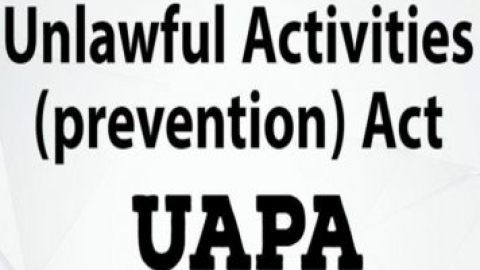UNLAWFUL ACTIVITIES (PREVENTION) ACT (UAPA)
- This law seeks effective prevention of unlawful activities associations in India.
- Making powers available for dealing with activities subversive to the integrity and sovereignty of India.
- UAPA makes it a crime to support any secessionist movement or to support claims by a foreign power to what India claims as its territory.
- The UAPA, framed in 1967, has been already amended twice since: first in 2008 and then in 2012 and now again.
KEY FEATURES OF THE BILL
The Bill amends the Unlawful Activities (Prevention) Act, 1967
- Who may commit terrorism: Under the Act, the central government may designate an organisation as a terrorist organisation if it:
- commits or participates in acts of terrorism,
- prepares for terrorism,
- promotes terrorism, or
- otherwise involved in terrorism.
- The Bill additionally empowers the government to designate individuals as terrorists on the same grounds.
- Approval for seizure of property by NIA
- Investigation by NIA: The Bill empowers the officers of the NIA, of the rank of Inspector or above, to investigate cases. The name of such a person will be included in the ‘Fourth Schedule’ proposed to be added in the parent Act.
- Insertion to schedule of treaties: The Act defines terrorist acts to include acts committed within the scope of any of the treaties listed in a schedule to the Act. The Schedule lists nine treaties, including the Convention for the Suppression of Terrorist Bombings (1997), and the Convention against Taking of Hostages (1979). The Bill adds another treaty to the list. This is the International Convention for Suppression of Acts of Nuclear Terrorism (2005).
GROUNDS FOR OPPOSITION
- The Act introduces a vague definition of terrorism to encompass a wide range of non-violent political activity, including political protest.
- It empowers the government to declare an organisation as ‘terrorist’ and ban it. Mere membership of such a proscribed organisation itself becomes a criminal offence.
- It allows detention without a chargesheet for up to 180 days and police custody can be up to 30 days.
- A strong presumption is created against bail and anticipatory bail is out of the question.
- Presumption of guilt for terrorism offences merely based on the evidence allegedly seized.
- It authorises the creation of special courts, with wide discretion to hold in-camera proceedings (closed-door hearings) and use secret witnesses but contains no sunset clause and provisions for mandatory periodic review.
- The only statutory remedy available to such a person is to make an application before the Central Government for de-notification, which will be considered by a Review Committee constituted by the Government itself.
- Designation of a terrorist is equivalent to ‘civil death’ for a person, with social abhorrence and isolation, expulsion from job, media hounding, and attack from self- vigilante groups.
- The law could target minorities or a section of people thereby affecting their cultural rights.
GROUNDS FOR SUPPORT
- Terrorist acts are committed not by organizations but by individuals.
- India faces one of the highest threats of terrorism in the world and therefore its counter-terrorism mechanism must be stringent.
- Non-designation of individuals as terrorists provides them an opportunity to circumvent the law, resurge with a different name and continue their terror activities.
- Investigation by inspector rank officer would help solve the human resource crunch in the NIA.
- This move would quicken the delivery of justice in UAPA related cases, which are reviewed by senior officers at various levels.
CONCLUSION
Terrorism is a global problem and the UN along with several other countries, have provisions in their laws to designate individuals as terrorists. An individual’s psychology is the birth place of Terrorism, rather than an institution. If, in the first place, an individual is stopped from attracting other individuals into terrorism by providing ideological and financial support, this menace can be finished. Hence, designating an individual as terrorist, after following the due process of law, is of prime importance to nip terrorism in the bud.
Union Minister for Home Affairs replying to the debate on the Bill, appealed to the House to pass the bill unanimously to send a strong message to the world that terrorists are the enemies of humanity and India is committed to finish terror from its soil.
Government should maintain balance between fundamental rights and national security. Hence it should finish cases as soon as possible along with guidelines to be followed and not as a tool to stop voice against it





















































